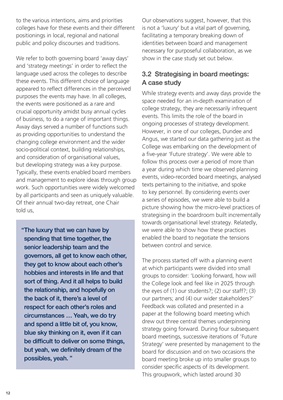
12
to the various intentions, aims and priorities
colleges have for these events and their different
positionings in local, regional and national
public and policy discourses and traditions.
We refer to both governing board 'away days'
and 'strategy meetings' in order to reflect the
language used across the colleges to describe
these events. This different choice of language
appeared to reflect differences in the perceived
purposes the events may have. In all colleges,
the events were positioned as a rare and
crucial opportunity amidst busy annual cycles
of business, to do a range of important things.
Away days served a number of functions such
as providing opportunities to understand the
changing college environment and the wider
socio-political context, building relationships,
and consideration of organisational values,
but developing strategy was a key purpose.
Typically, these events enabled board members
and management to explore ideas through group
work. Such opportunities were widely welcomed
by all participants and seen as uniquely valuable.
Of their annual two-day retreat, one Chair
told us,
Our observations suggest, however, that this
is not a 'luxury' but a vital part of governing,
facilitating a temporary breaking down of
identities between board and management
necessary for purposeful collaboration, as we
show in the case study set out below.
3.2 Strategising in board meetings:
A�case�study
While strategy events and away days provide the
space needed for an in-depth examination of
college strategy, they are necessarily infrequent
events. This limits the role of the board in
ongoing processes of strategy development.
However, in one of our colleges, Dundee and
Angus, we started our data gathering just as the
College was embarking on the development of
a five-year 'Future strategy'. We were able to
follow this process over a period of more than
a year during which time we observed planning
events, video-recorded board meetings, analysed
texts pertaining to the initiative, and spoke
to key personnel. By considering events over
a series of episodes, we were able to build a
picture showing how the micro-level practices of
strategising in the boardroom built incrementally
towards organisational level strategy. Relatedly,
we were able to show how these practices
enabled the board to negotiate the tensions
between control and service.
The process started off with a planning event
at which participants were divided into small
groups to consider: 'Looking forward, how will
the College look and feel like in 2025 through
the eyes of (1) our students?; (2) our staff?; (3)
our partners; and (4) our wider stakeholders?'
Feedback was collated and presented in a
paper at the following board meeting which
drew out three central themes underpinning
strategy going forward. During four subsequent
board meetings, successive iterations of 'Future
Strategy' were presented by management to the
board for discussion and on two occasions the
board meeting broke up into smaller groups to
consider specific aspects of its development.
This groupwork, which lasted around 30
"�The�luxury�that�we�can�have�by�
spending that time together, the
senior leadership team and the
governors, all get to know each other,
they�get�to�know�about�each�other's�
hobbies and interests in life and that
sort of thing. And it all helps to build
the�relationship,�and�hopefully�on�
the�back�of�it,�there's�a�level�of�
respect�for�each�other's�roles�and�
circumstances�…�Yeah,�we�do�try�
and�spend�a�little�bit�of,�you�know,�
blue�sky�thinking�on�it,�even�if�it�can�
be�difficult�to�deliver�on�some�things,�
but�yeah,�we�definitely�dream�of�the�
possibles,�yeah.�"